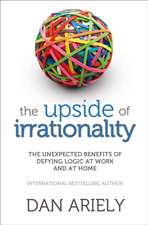Predictably Irrational, Revised and Expanded Edition: The Hidden Forces That Shape Our Decisions. Bestseller
Autor Dr. Dan Arielyen Limba Engleză Paperback – 26 apr 2010
“An important book. Full of valuable and entertaining insights that will make an impact on your business, professional, and personal life.” — Jack M Greenberg, Chairman, Western Union Company, Retired Chairman and CEO, McDonald's Corporation
Why do our headaches persist after we take a one-cent aspirin but disappear when we take a fifty-cent aspirin? Why do we splurge on a lavish meal but cut coupons to save twenty-five cents on a can of soup?
When it comes to making decisions in our lives, we think we're making smart, rational choices. But are we? In this newly revised and expanded edition of the groundbreaking New York Times bestseller, Dan Ariely refutes the common assumption that we behave in fundamentally rational ways. From drinking coffee to losing weight, from buying a car to choosing a romantic partner, we consistently overpay, underestimate, and procrastinate. Yet these misguided behaviors are neither random nor senseless. They're systematic and predictable—making us predictably irrational.
| Toate formatele și edițiile | Preț | Express |
|---|---|---|
| Paperback (2) | 60.76 lei 17-24 zile | +5.26 lei 6-12 zile |
| HarperCollins Publishers – 10 mai 2010 | 60.76 lei 17-24 zile | +5.26 lei 6-12 zile |
| HarperCollins Publishers – 26 apr 2010 | 107.96 lei 3-5 săpt. | +13.48 lei 6-12 zile |
| Hardback (1) | 179.63 lei 3-5 săpt. | +20.29 lei 6-12 zile |
| HarperCollins Publishers – 18 mai 2009 | 179.63 lei 3-5 săpt. | +20.29 lei 6-12 zile |
Preț: 107.96 lei
Nou
20.66€ • 21.57$ • 17.10£
Carte disponibilă
Livrare economică 14-28 martie
Livrare express 27 februarie-05 martie pentru 23.47 lei
Specificații
ISBN-10: 0061353248
Pagini: 384
Dimensiuni: 135 x 203 x 22 mm
Greutate: 0.29 kg
Ediția:Revised and Exp
Editura: HarperCollins Publishers
Colecția HarperPerennial
Textul de pe ultima copertă
Why do our headaches persist after we take a one-cent aspirin but disappear when we take a fifty-cent aspirin?
Why do we splurge on a lavish meal but cut coupons to save twenty-five cents on a can of soup?
When it comes to making decisions in our lives, we think we're making smart, rational choices. But are we?
In this newly revised and expanded edition of the groundbreaking New York Times bestseller, Dan Ariely refutes the common assumption that we behave in fundamentally rational ways. From drinking coffee to losing weight, from buying a car to choosing a romantic partner, we consistently overpay, underestimate, and procrastinate. Yet these misguided behaviors are neither random nor senseless. They're systematic and predictable—making us predictably irrational.
Recenzii
Descriere
"A marvelous book… thought provoking and highly entertaining." —Jerome Groopman, New York Times bestselling author of How Doctors Think
“An important book. Full of valuable and entertaining insights that will make an impact on your business, professional, and personal life.” — Jack M Greenberg, Chairman, Western Union Company, Retired Chairman and CEO, McDonald's Corporation
Why do our headaches persist after we take a one-cent aspirin but disappear when we take a fifty-cent aspirin? Why do we splurge on a lavish meal but cut coupons to save twenty-five cents on a can of soup?
When it comes to making decisions in our lives, we think we're making smart, rational choices. But are we? In this newly revised and expanded edition of the groundbreaking New York Times bestseller, Dan Ariely refutes the common assumption that we behave in fundamentally rational ways. From drinking coffee to losing weight, from buying a car to choosing a romantic partner, we consistently overpay, underestimate, and procrastinate. Yet these misguided behaviors are neither random nor senseless. They're systematic and predictable—making us predictably irrational.
Notă biografică
Dan Ariely is the bestselling author of Predictably Irrational, The Upside of Irrationality, and The (Honest) Truth About Dishonesty. He is the James B. Duke Professor of Psychology and Behavioral Economics at Duke University and is the founder of the Center for Advanced Hindsight. His work has been featured in the New York Times, the Wall Street Journal, the Washington Post, the Boston Globe, and elsewhere. He lives in North Carolina with his family.
















